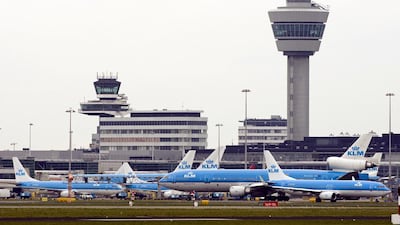A panel of aviation industry professionals have said more taxes are coming for airlines after the French government imposed levies on outbound flights over the summer to reduce carbon emissions and tackle climate change.
“If aviation was a country, it would be the seventh largest carbon emitting country on earth, just behind Germany," Justin Francis, co-founder and chief executive of Responsible Travel, told the World Travel Market conference in London on Wednesday.
“The International Civil Aviation Organisation forecasts aviation emissions to grow by [at least] 300 per cent by 2050.
"In the UK by 2050, they forecast that aviation will be the single biggest cause of carbon emissions, bigger than the car industry."
Mr Francis said low-cost carrier Ryanair was the 10th biggest carbon emitter in Europe, across industries.
“We are an industry with a copious demand for old school fossil fuel energy for international flying, and we are also an industry that benefits from tax subsidies," he said.
"That is a very uncomfortable position to be in.”
Mr Francis said there was a belief in other industries that were drastically reducing carbon emissions that the aviation sector was given “a free pass”, referring to aviation fuel subsidies.
He called for more taxes to be introduced to reduce airlines’ carbon emissions and reduced frequency of flights.
In June, France announced that it was introducing an "eco-tax" for air fares from French airports, starting next year.
The tax, which will be invested into less-polluting transport such as rail, is expected to raise about €180 million (Dh731.6m) from 2020, former transport minister Elisabeth Borne said at the time.
Germany is also looking to tax flights from 2020.
Chris Lyle, chief executive of Air Transport Economics, said despite the efforts being made by some European governments, in general not enough was being done by politicians to reduce the industry’s emissions.
But Mr Lyle said the private sector had showed some signs of promise.
He spoke of Air France offsetting carbon and British Airways-owner IAG “taking the bold step” by pledging to achieve net zero carbon emissions by 2050.
But Mr Lyle said that more “taxation is coming. we don't have a choice about it”.
“It's already happening. Germany, France, the Netherlands – you're going to see more and more of it,” he said.
Mr Lyle said he thought the taxes so far had not had much of an effect because they had not been significant enough to change travellers’ flying habits.
He also spoke out against the money from eco-taxes going towards central treasuries, where they could get “lost”.
“A lot of it should be hypothecated, for example, towards power-to-liquid fuels,” Mr Lyle said.
"That way you've got the airlines on your side and they know what they're doing. If they can see some way of an expected benefit from it, it will work."
Fellow panellist Neil Cloughley, managing director of Faradair Aerospace, said that commercial aviation executives were listening to critics who say the industry had to become greener.
“Commercial aviation is not deaf to the market and the problems they face,” Mr Cloughley said.
“I think they are improving the engine technology and they are improving the aircraft technology, but obviously there’s a certain inflation by the technology that's available.”
Faradair is looking to launch a new hybrid electric aircraft design in the mid-2020s, but airlines have long complained that sustainable technology, along with biofuels, is too expensive.
Although the technology may be costly and a long-haul aircraft powered entirely by battery is not yet available, Mr Cloughley said greener technology could be used at airports before the aircraft has taken off.
"If you walk within three miles of any airport today you will smell the airport before you see it. That's a problem," he said.
"And that isn't to do with anything to with the amount or volume of aircraft flying through the skies.”
Mr Cloughley said it was caused by aircraft being taxied or being prepared before taking off or after landing.
To remedy this, he said airports should insist that airlines used more hybrid and electronic methods to power jets before they flew to save costs and be more environmentally friendly.
One audience member suggested the airline industry should abandon the concept of connecting flights to reduce carbon emissions.
But panellist Angela Foster-Rice, principle at Aerial Consulting and a former Delta Air Lines executive, said the hub-and-spoke model meant aircraft were more likely to be filled to capacity.

